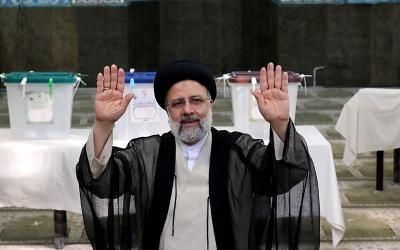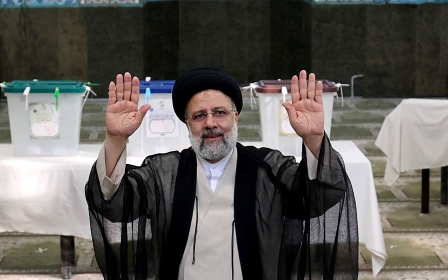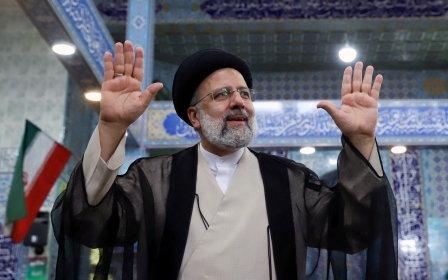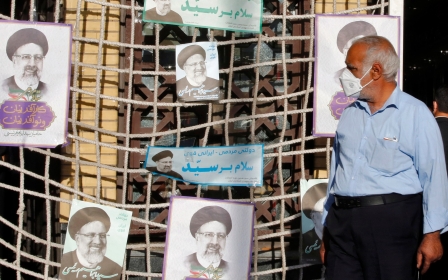Iran: Hardline cleric Ebrahim Raisi wins presidential vote
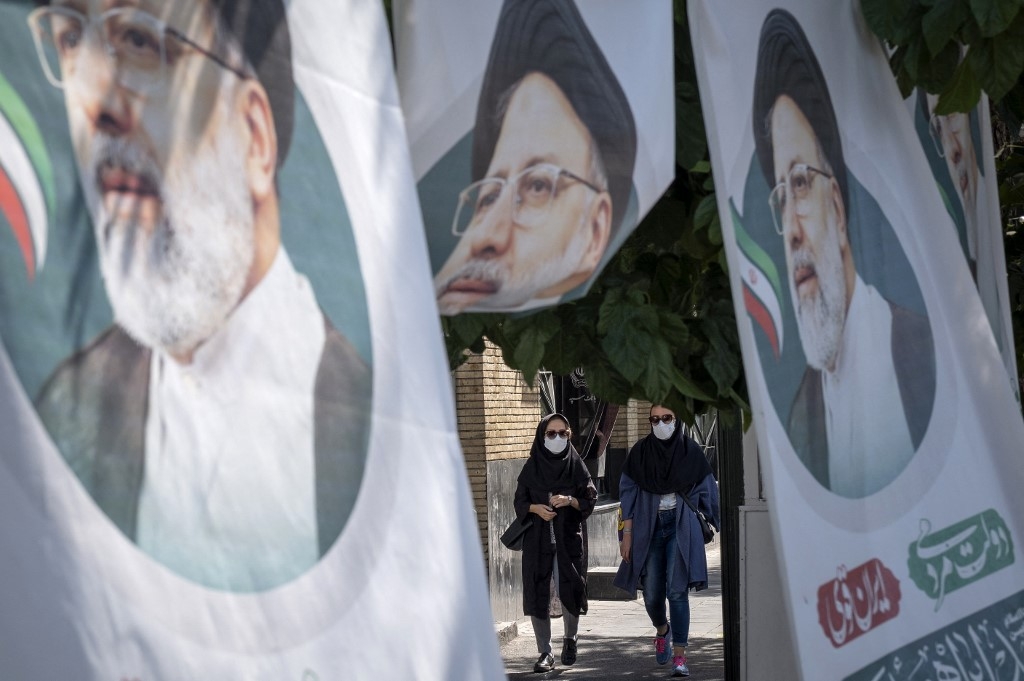
Hardline cleric Ebrahim Raisi was declared the winner on Saturday of Iran's presidential election, a widely anticipated result after many political heavyweights were barred from running.
Raisi was elected president with 61.95 percent of the vote, according to figures released by Interior Minister Aboldreza Rahmani Fazli. The three other candidates had conceded defeat earlier on Saturday.
Voter turnout was 48.8 percent of the more than 59 million eligible voters, the minister said, a record low for a presidential election in the Islamic Republic.
Despite the figures, Supreme leader Ayatollah Ali Khamenei said the turnout had demonstrated public support for the establishment.
"I congratulate the people on their choice," said outgoing moderate President Hassan Rouhani, who has served the maximum of two consecutive four-year terms and leaves office in August.
Iran's Foreign Minister said on Saturday that Raisi was the country's new elected president and everyone would have to work with him from now on.
Mohammad Javad Zarif also told a diplomacy forum in the Turkish resort of Antalya that issues in Iran's nuclear talks with Western powers were not insurmountable and he hoped to achieve a result before August
Raisi, 60, is set to take over at a critical time, as Iran seeks to salvage its tattered nuclear deal with major powers and free itself from punishing US sanctions that have driven a sharp economic downturn.
Turkey and the United Arab Emirates (UAE) were among the first countries to congratulate Raisi on his victory.
"Stating my belief that cooperation between our two countries will strengthen during your presidency, I am ready to work together with you," Turkey President Recep Tayyip Erdogan said in a letter sent to Raisi.
Erdogan added that he was looking forward to visiting Iran after the Covid-19 pandemic.
"We wish for the Islamic Republic, and for our bilateral relations, stability, continuity and prosperity," UAE Vice-President and de facto Dubai ruler Sheikh Mohammed bin Rashid said in a statement tweeted by Dubai's media office.
Abu Dhabi Crown Prince Sheikh Mohammed Bin Zayed also sent a message of congratulations, state news agency WAM reported.
Close to supreme leader
The head of the Iranian judiciary, whose black turban signifies direct descent from Islam's Prophet Mohammed, Raisi is seen as close to the 81-year-old Khamenei, who has ultimate political power in Iran.
Friday's voting was extended by two hours past the original midnight deadline amid fears of a low turnout.
Many voters chose to stay away after the field of some 600 hopefuls, including 40 women, had been winnowed down to seven male candidates, with an ex-president and a former parliament speaker both excluded.
Three of the vetted candidates dropped out of the race two days before Friday's election.
Populist former president Mahmoud Ahmadinejad, one of those barred from running by the Guardian Council of clerics and jurists, said he would not vote, declaring in a video message that "I do not want to have a part in this sin".
Raisi's victory was effectively confirmed on Saturday when he received the congratulations of the incumbent and the three other candidates - fellow hardliners Mohsen Rezai and Amirhossein Qazizadeh Hashemi, and reformist Abdolnasser Hemmati.
'Save the people'
On election day, pictures of often flag-waving voters dominated state TV coverage, but away from the polling stations some voiced anger at what they saw as a stage-managed election aiming to cement the control of hardliners.
"Whether I vote or not, someone has already been elected," Tehran shopkeeper Saeed Zareie told AFP. "They organise the elections for the media."
Enthusiasm was dampened further by spiralling inflation and job losses, and the Covid-19 pandemic that proved more deadly in Iran than anywhere else in the region, killing more than 80,000 people by the official count.
Among those who queued to vote at schools, mosques, and community centres, many said they supported Raisi, who has promised to fight corruption, help the poor and build millions of flats for low-income families.
A nurse named Sahebiyan said she backed him for his anti-fraud credentials and because she hopes he will "move the country forward... and save the people from economic, cultural and social deprivation".
Raisi, who holds deeply conservative views on many social issues, including the role of women in public life, has been named in Iranian media as a possible successor to Khamenei.
Call for probe
To opposition and human rights groups, his name is linked to the mass execution of political prisoners in 1988. The US government has sanctioned him over the purge, although Raisi has denied playing a part.
Asked in 2018 and again last year about the executions, Raisi denied playing a role, even as he lauded an order he said was handed down by the Islamic republic's founder Ayatollah Ruhollah Khomeini to proceed with the purge.
Rights groups on Saturday renewed a call for Raisi to be investigated for his role in the purge.
"The circumstances surrounding the fate of the victims and the whereabouts of their bodies are, to this day, systematically concealed by the Iranian authorities, amounting to ongoing crimes against humanity," Amnesty International Secretary General Agnes Callamard said in a statement.
"Iranian authorities paved the way for Ebrahim Raisi to become president through repression and an unfair election," Michael Page, deputy Middle East director at Human Rights Watch, said in a statement.
"As head of Iran’s repressive judiciary, Raisi oversaw some of the most heinous crimes in Iran’s recent history, which deserve investigation and accountability rather than election to high office."
Middle East Eye delivers independent and unrivalled coverage and analysis of the Middle East, North Africa and beyond. To learn more about republishing this content and the associated fees, please fill out this form. More about MEE can be found here.


